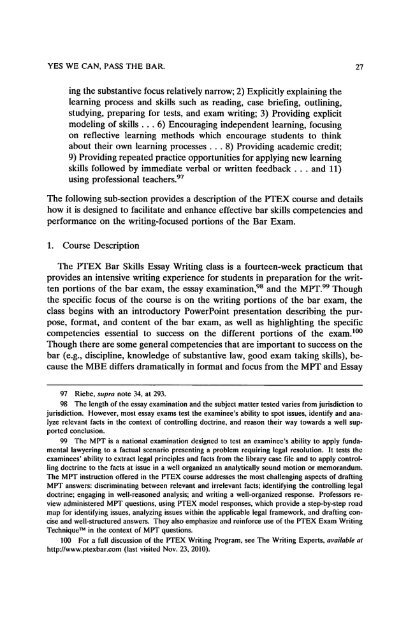Download Full Volume - UDC Law Review
Download Full Volume - UDC Law Review
Download Full Volume - UDC Law Review
- No tags were found...
You also want an ePaper? Increase the reach of your titles
YUMPU automatically turns print PDFs into web optimized ePapers that Google loves.
YES WE CAN, PASS THE BAR.ing the substantive focus relatively narrow; 2) Explicitly explaining thelearning process and skills such as reading, case briefing, outlining,studying, preparing for tests, and exam writing; 3) Providing explicitmodeling of skills ... 6) Encouraging independent learning, focusingon reflective learning methods which encourage students to thinkabout their own learning processes ... 8) Providing academic credit;9) Providing repeated practice opportunities for applying new learningskills followed by immediate verbal or written feedback ... and 11)using professional teachers. 97 27The following sub-section provides a description of the PTEX course and detailshow it is designed to facilitate and enhance effective bar skills competencies andperformance on the writing-focused portions of the Bar Exam.1. Course DescriptionThe PTEX Bar Skills Essay Writing class is a fourteen-week practicum thatprovides an intensive writing experience for students in preparation for the writtenportions of the bar exam, the essay examination,98 and the MPT.99 Thoughthe specific focus of the course is on the writing portions of the bar exam, theclass begins with an introductory PowerPoint presentation describing the purpose,format, and content of the bar exam, as well as highlighting the specificcompetencies essential to success on the different portions of the exam. looThough there are some general competencies that are important to success on thebar (e.g., discipline, knowledge of substantive law, good exam taking skills), becausethe MBE differs dramatically in format and focus from the MPT and Essay97 Riebe, supra note 34, at 293.98 The length of the essay examination and the subject matter tested varies from jurisdiction tojurisdiction. However, most essay exams test the examinee's ability to spot issues, identify and analyzerelevant facts in the context of controlling doctrine, and reason their way towards a well supportedconclusion.99 The MPT is a national examination designed to test an examinee's ability to apply fundamentallawyering to a factual scenario presenting a problem requiring legal resolution. It tests theexaminees' ability to extract legal principles and facts from the library case file and to apply controllingdoctrine to the facts at issue in a well organized an analytically sound motion or memorandum.The MPT instruction offered in the PTEX course addresses the most challenging aspects of draftingMPT answers: discriminating between relevant and irrelevant facts; identifying the controlling legaldoctrine; engaging in well-reasoned analysis; and writing a well-organized response. Professors reviewadministered MPT questions, using PTEX model responses, which provide a step-by-step roadmap for identifying issues, analyzing issues within the applicable legal framework, and drafting conciseand well-structured answers. They also emphasize and reinforce use of the PTEX Exam WritingTechnique in the context of MPT questions.100 For a full discussion of the PTEX Writing Program, see The Writing Experts, available athttp://www.ptexbar.com (last visited Nov. 23, 2010).














